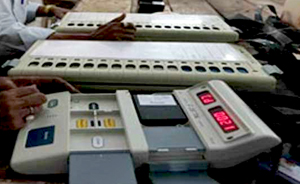 New Delhi, Nov 30: In a first, the Delhi Chief Electoral Office will keep a "live watch" on 630 critical booths through web-casting to deter people from indulging in any nuisance on the polling day.
New Delhi, Nov 30: In a first, the Delhi Chief Electoral Office will keep a "live watch" on 630 critical booths through web-casting to deter people from indulging in any nuisance on the polling day.
Besides, CCTV cameras will be installed and central paramilitary force personnel along with micro observers will be present inside the critical polling stations.
"For the first time we will be introducing web casting in almost all the critical and hyper critical polling booths by which we will be able to see all the proceedings happening on the ground in those polling stations on a live basis in our control rooms," Chief Electoral Officer Vijay Dev told PTI today.
"So rather than doing a post-mortem of the events collected through CCTV, we will be able to keep a constant track of all the proceedings," Dev added.
He said, apart from that, there will be micro observers stationed inside the critical booths along with CCTV cameras installed.
The micro observer will be a central government official monitoring the sequence of events at the polling booths and will report directly to the Election Commission, Dev said.
He said that as many as 107 companies (around 100 personnel each) of central paramilitary force along with 64,000 Delhi police personnel will be deployed to carry out fair and free polling on December 4.
All these initiatives, he said, will act as deterrent for those attempting any nuisance and also instill confidence among people.
Dev said they were carrying out extensive review of the security arrangements in all the districts and a detailed review is being taken from all the DC's, DCPs and all the observers who have been deputed in these districts.
"The last 72 hours are extremely crucial and we are ensuring that all our flying squads, static surveillance teams and video surveillance teams are all active so that we can instantly cater to all the areas where there is apprehension of use of liquor, money and musclemen for vitiating the polls," he said.
They are also strengthening border vigil especially in North East and South west districts.
"We are going to ensure that in cooperation with states like UP and Haryana we are able to mount a tight vigil and ensure that there is no movement of liquor, cash and musclemen which have the potential of vitiating our polls," Dev said.






Comments
Add new comment